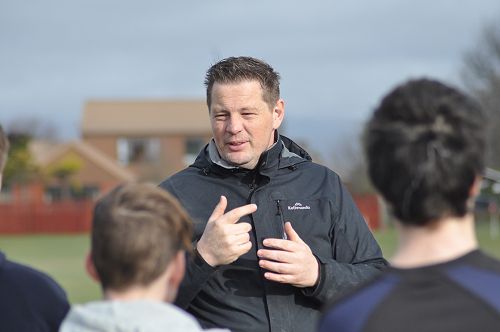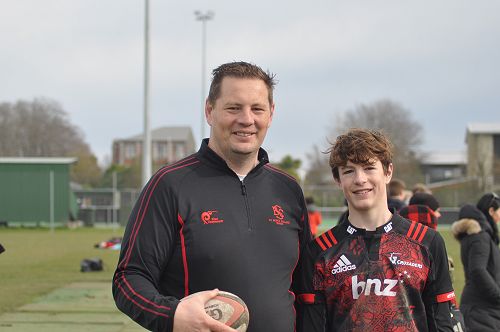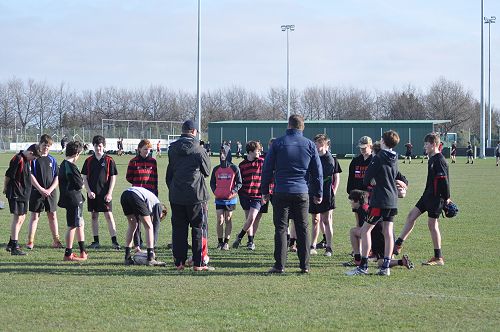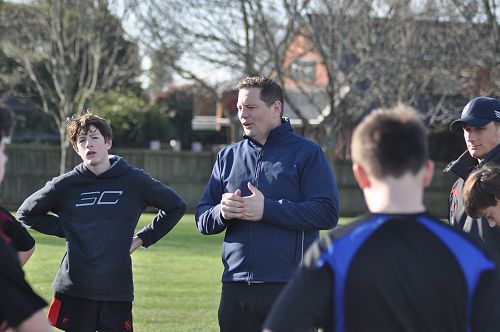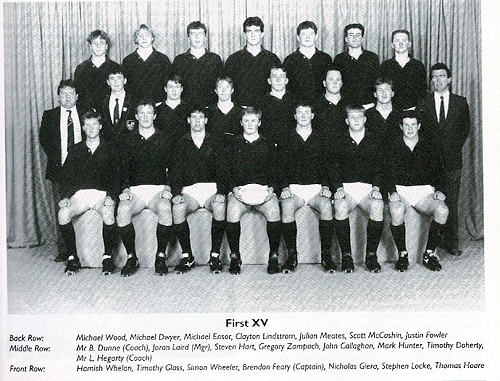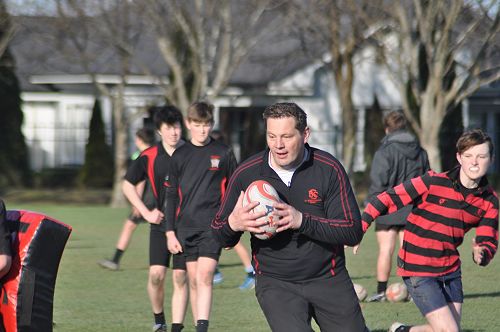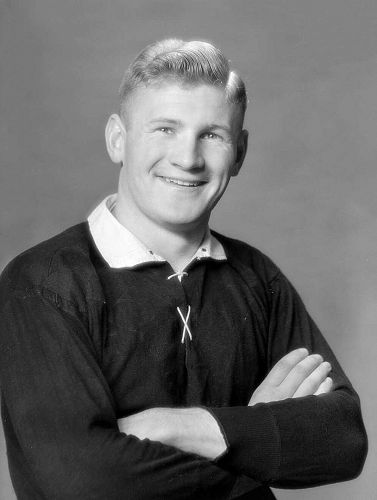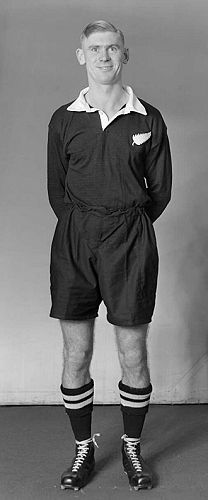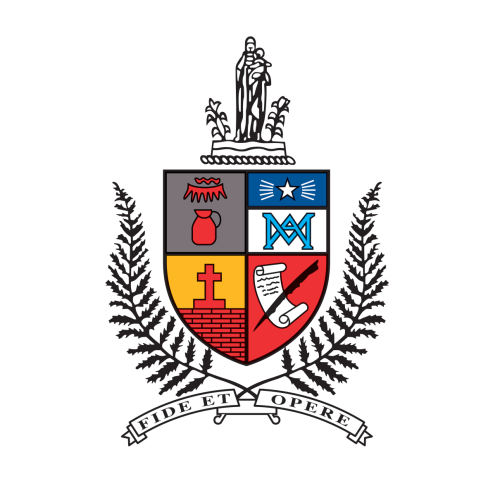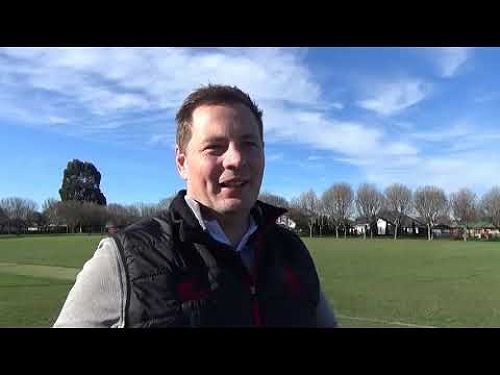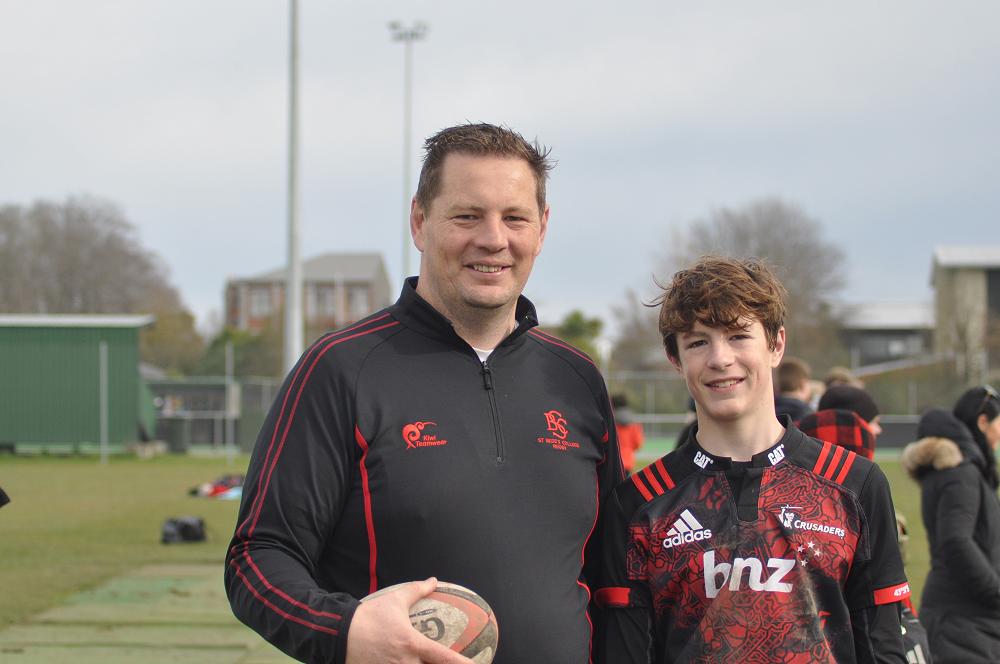
Meates Family
Two generations of coaches and three of players
The Meates family’s story of three generations of involvement in St. Bede’s College rugby began during the Second World War with Bill Meates playing in the 1st XV in 1942. Bill was such a prodigious talent that he represented Canterbury in his first year out of school in 1943. A wing and centre, after serving in the New Zealand Army he returned to play provincial rugby for Canterbury and Otago, including some superb performances during Otago’s Ranfurly Shield reign of the late 1940s. His outstanding form for Otago propelled him into the All Blacks, for whom he played a total of 20 games including 7 test matches.
Bill’s experience playing in 1945 for the 2nd NZ Expeditionary Force Army team, known as the “Kiwis”, saw him bring back rugby knowledge that contributed to the transformation of New Zealand rugby in the early 1950s and his cricketing ability was such that he has been described as one of the College’s best ever cricketers.
Bill’s younger brother Kevin played rugby at St. Bede’s from 1945 to 1947. Bill had made such an impression on the sporting front that when 14 year-old Kevin arrived from the West Coast to join the 6th form at St. Bede’s he was injected straight into the 1st XV on the assumption that he was another Meates sporting prodigy! Needless to say, it was unrealistic to expect that a lad four years younger than most of the other 1st XV forwards would immediately shine. Kevin was duly demoted through the teams but in his last of school, 1947, was reselected as a prop. That year, now back from the war, older brother Bill was tutoring at St. Bede’s and helping to coach the 1st XV. So began the Meates family legacy of involvement in the coaching of sport at the College. Over seventy years later, in 2020, Kevin’s son and Bill’s nephew Julian is coaching his son Olly’s U63kgs team at St. Bede’s.
After finishing school, Kevin made the Canterbury team in 1951 as a loose forward and lock, before being recognised by the national selectors in 1952 when he played in two tests against the touring Wallabies. Bill and Kevin Meates are the only brothers to have completed their secondary education at St. Bede’s before going on to the represent the All Blacks. It is interesting to note that while the brothers Bob and Kevin Stuart also became All Blacks, Bob actually finished his secondary school education at St. Kevin’s in Oamaru. Kevin Meates was tipped to become a long-term All Black but his playing career was affected by injuries, meaning that he appeared in just 52 first class matches, 44 of which were for Canterbury.
Following on his brother Bill’s coaching at school, Kevin Meates coached our U15A team with Fr. Norm Scambary for four years, also helping to organise coaching days at which coaches such as Laurie O’Reilly from UCRFC contributed their time and expertise to help our players.
In 1972, Kevin’s oldest son Mark was the first of the next generation of Meates family boys to enter St. Bede’s. From that year on, for two decades until 1992, when Kevin’s youngest son Julian graduated, every year there was a Meates boy attending St. Bede’s and playing rugby.
Mark describes his sporting involvement from 1974 on as follows: “I started taking rugby more seriously in the 5th form and also started rowing. I was only on the bench for the 1st XV in the 5th form, but was a starting member in 75 and 76. In those years I was also a member of the rowing 8 and 4. We had some good wins in the rugby but started a bit of a renaissance in rowing, getting second in both the 4 and 8 at the Maadi Cup.”
The 1980s for Mark was a decade of high-level sporting performance in both rowing and rugby - NZ rowing champions in the Avon Club Senior 8, club championship victories in a legendary University of Canterbury RFC team, selection for the NZ coxed four to go to the Los Angeles Olympics and playing for the 1982 New Zealand Universities rugby team in Japan and New Zealand. In 1980 Mark was selected as Canterbury RFU Colt of the Year and University of Canterbury Sportsperson of the Year. While there were highs, there were also some challenging experiences. Mark was selected in coxed four for the Olympics in 1984 but was made the reserve two weeks before the team left for Los Angeles, so didn’t get on the water in the New Zealand crew. He then suffered a serious eye injury in 1985 just when he had become a strong contender to take over from Don Hayes on the flank in the Canterbury rugby team. Mark’s Olympic experience would go on to influence his thinking as a coach on selection and participation in years to come.
Mark, wife Mary and eldest son Thomas headed to Kumamoto in southern Japan at the end of 1987 to play rugby as one the first foreign players to be employed by a Japanese corporation. The stayed for three and a half years with sons Alex and William being born in Japan. After playing in Japan he went to New York to study at Columbia University, where he became player/coach for their rugby team. From that point on Mark’s focus became coaching and managing.
He managed the NZ Universities rugby team in 1999, 2000 and 2001, with injuries to players in the regular squad even presenting him with the opportunity to appear for NZU at the age of 41 in 2000 in Hong Kong. Since then Mark has coached NZU, Honda in Japan and Krasny Yar RFC in Siberia as well as several University of Canterbury teams, and has managed the NZ Youth Olympic rowing team and the NZ Junior rowing team. In terms of consistent ongoing involvement in rugby, Mark must be among the most active old boys of St. Bede’s College. His contribution to University of Canterbury and New Zealand Universities rugby was formally recognised with the conferment of life membership in 2009 and 2016 respectively.
Mark explains: “Sport has taken me to many places I would otherwise not have been. I have been able to do things I would otherwise not. Most of all, I have met and continue to meet some of the world’s best and most interesting characters. These experiences are the true riches in my life, and it all started in my last two years at St. Bede’s. But I must say, the most significant achievement of it all was my choice of partner in life, who allowed me to do it all.”
“My greatest point of pride is in our children. They were all pretty good at sport in their own right, but in recent years it is as coaches that they are making their mark - Thomas coaching rugby and William and Alex rowing and Harriet coaching swimming. This year Will was selected as Coach of the Year at the Canterbury Rowing Club and Alex, as Coach of the Year at the Canterbury Rowing Association. Alex is also a selector of the NZ Junior Rowing team. I am not sure that I can claim much credit for their successes, but I like to think that something rubbed off along the way. Either way, Mary and I are very proud of them.”
The next of the Meates brothers to attend St. Bede’s was Rob, who played in the 1st XV in 1977. Rob followed his father and Mark to the University RFC and went on to coach karate for many years. After Rob followed Kev, Jeremy, Andrew and Julian.
Mark and Mary’s oldest son Thomas was in the 1st XV in 2004 and 2005, going on to play at University of Canterbury and NZ Universities in from 2001 to 2003. He took up coaching at UC, Marist Albion and mostly recently Christchurch FC.
Mark’s youngest brother Julian is now coaching the U63kgs “Red” team in which son Olly plays, extending the rare, three generational rugby involvement in St. Bede’s rugby. The 1992 Bedean describes Julian as follows: “Julian Meates cemented his place as blindside flanker after good displays in Australia. He provided valuable height and bulk and quickly learnt the skills required of his position.”
Julian also went on to play senior rugby for University of Canterbury and was part of the New Zealand Universities (NZU) side that played in the Student World Cup in South Africa in 1996. Unfortunately a misguided tackle ended his rugby career when he broke his neck in 1997 playing in an NZU trial game a few days before his planned departure to take up a rugby contract in Japan.
Almost 30 years later, then 1st XV coach “Baz” Dunne states: “I do remember how much Julian improved that year, to the extent that he became a dominant player on the field. I remember playing with Julian’s older brother Mark in 1975, and I did sense then that he had the physical power and ability that would see him go on to become such a force in senior rugby for Varsity for a number of years. At one stage in our rugby history it seemed like there was always a Meates boy in the 1st XV.”
Julian’s wife Lou comments: “I became part of this family 16 years ago and I can tell you I’ve been amazed at the amount of sporting codes they play, coach and mentor, from brothers and sisters-in-laws to nephews and nieces! There is definitely no shortage of volunteer spirit here. Our older son Olly started playing rugby in 2013 and I think there’s only been one season where Julian wasn’t coaching. He loves the interaction with the kids and parents and while I am biased of course, I think he’s got a great rapport with the kids. The last two years he’s coached both our sons’ rugby teams and our young son Archie’s cricket team. It’s hectic and a lot of time is given up but I don’t think he’d have it any other way.”
Julian Meates:
What do you think of the advent of weight-grades specifically designed for lighter Year 9 and 10 boys?
“What I know from my own experience, and from analysis done on many schools 1st XVs is that the superstars at the age of 13 and 14 often are not superstars at 17 and 18. In fact it is not uncommon that some players in 1st XVs have never even made an A side in their younger years.”
“The most obvious background factor with junior rugby is puberty. Some kids go through puberty earlier than others, so whilst in Year 9 they are massive and dominate, by the time they are in Year 13 they are no longer the biggest, and the smaller kids have grown up out of nowhere.”
“We are fortunate that our school is a very strong rugby school. We simply have more players playing than the other schools, other than Boys’ High, so in some respects it becomes a numbers game as to who is best, mixed in with some exceptional talent from time to time.
The reintroduction of the underweight grades has allowed us to increase the numbers of boys playing. In recent years, rugby has been suffering from a massive drop off of players in the 13 to 16 year-old group largely because smaller kids are sick of being “beaten up” by big kids. What we have seen, particularly this year, is a good number kids playing rugby who would more than likely not be playing if the only option was open-weight.”
“At St. Bede’s last year we took the slightly controversial approach in that we entered two relatively even teams in the under 58 weight grade as opposed to entering an “A” and a “B” team, and this proved to be very effective. The outcome is that 40 kids played high quality, competitive rugby against boys of similar size. There is no question that if we fielded an “A” team it would win every game, probably by a cricket score, and that the “B” team would probably have lost every game. Because of Covid 19, this year we decided to basically keep the 2 teams from last year. I think out of the two squads, a couple of boys gave up rugby, a couple stayed to play in the Under 14 open grade, and we managed to get 5 or 6 new ones. As it has turned out the Black team has ended up stronger, primarily because some of their kids have shot up, and so even though the competition hasn’t been as even as it was last year, the ultimate outcome is that we have kept more boys playing, have hopefully improved their skills and general rugby knowledge, and will hopefully keep them in the game for next year.”
“I will certainly not be surprised if there are 4 or 5 boys out of the Under 63kgs teams pulling on the 1st XV jumper in a couple of years.”
Mark Meates:
How has rugby changed since you played at St. Bede’s?
“A significant difference from when I was playing at St. Bede’s is that back then many of the All Blacks did not come from so-called rugby schools. They came from teams where they had to battle and struggle through the grades. The fortitude and resilience they learned in the process is often not as easily gained in teams that win by cricket scores. These days our talent seems to be concentrated in an ever-shrinking number of powerhouse schools and as a result it would seem that avoiding blow-out scores in teenage rugby has become a major issue for the CRFU.”
What have you learned along the way?
“My focus as a coach has been to try to add value to the players - to improve their skills and teach them things I wish I had known when I was playing, such as the principles of attack and defence and goal-setting, to name but two. I think that as coaches we have a broader responsibility towards the players than just fashioning them into a competitive team. The longer I’ve coached the less important winning has become for me at junior levels.”
“I have come to understand that young players want to play. I think a youngster would rather play a whole game in a losing team than 2 or 3 minutes in a winning one. In that regard while having a bench of reserves is necessary sometimes, using them can be a difficult choice if winning is the one and only goal. I’m really glad that things have changed and that in age-grade rugby boys must get at least half-games. I’m pleased to know that St. Bede’s led the way on this.”
What do you think about skill development?
“It was interesting talking to Andy Ellis recently about ‘finals footy’. He said that in the approach to finals, the Crusaders get right back to basics focusing on lots of little things, the simple things. They are the things you have to get right and I think they are the things young players need to be taught more than anything else. A lot of skill development builds upon the more simple skills, but without those basic skills in place the more complex ones can’t be grasped. I think that is the trickiest challenge for coaches these days, to help the players understand where they are in terms of their skill development and what they need to learn next. Learning is a continuous process and practice is required to sharpen old skills as well as new.”
“To be a top rugby player now is not easy, there is so much more to know about the game than was the case when I was playing at St. Bede’s and university. In terms of skills, I would honestly say that it is better to be a master of a few key skills than to be mediocre at many. Selectors picking teams often have so many players to choose from that they are looking for reasons not to select someone rather than reasons why they should! So in this sense, a more complex skill executed poorly might just be the thing that takes your chance away. Therefore, first and foremost work hard to nail the basics of things like run/catch/pass and tackling.”
“So, to current Bedean rugby players I would say, don’t be in a hurry. Take your time to learn the basic skills well before moving on to the more complex ones. Super Rugby level athletes have all day to practice, but school boys don’t. A good pass is one that is easy to catch, not too high, not too low, but just right. Don’t throw bad passes, start with close passes before moving to wide ones. Learn the principles of 1 on 1 defence and get good at tackling - get good at low tackles before worrying about “ball-and-all” tackles. Maintain possession when you carry the ball - if you take the ball into contact make sure you look after it. Don’t lose it or knock it on. If you do, you could have saved yourself the effort and just given it to them. As in life in general, clean up your mistakes. But first and foremost, be prepared to work on your basic skills. With regard to fitness, you can probably run harder and faster than you are doing at the moment and even if you lift your output by 15 or 20 percent it is unlikely you will succumb to exhaustion on the pitch. Finally, in my experience Bedeans are tight, they stick together and look after each other. That is a great basis for a team.”
St. Bede’s College is very pleased and grateful that so many parents become directly involved in their sons’ sporting endeavours at the College.
Gallery
